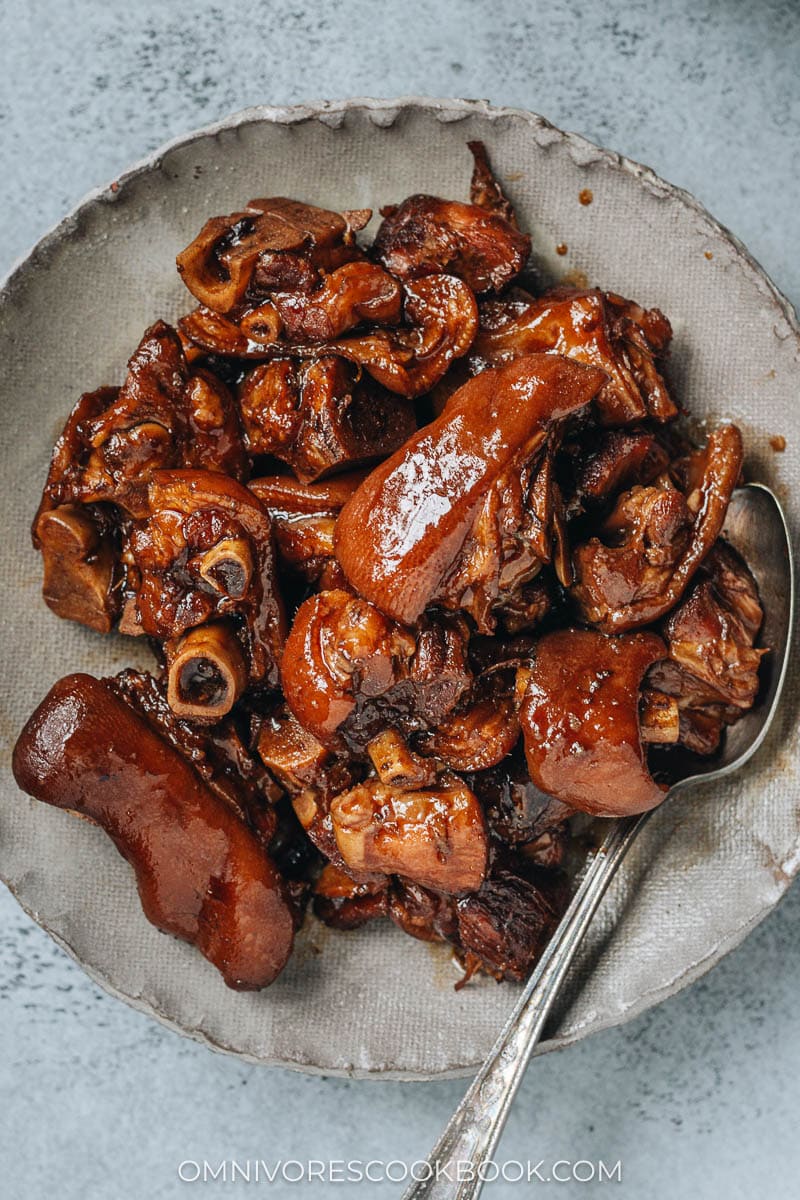
Chinese cuisine is known for utilizing different parts of the whole animal to create delicious meals. For example, chicken liver and pork liver are used to create tasty stir fries. Oxtail makes a super luxurious stew. Beef tripe, lung and tongue with red chili oil makes a rich tasting cold appetizer. Bones are often made into hearty bone broth for noodle soup and stews.
Braised pork trotters is one of my favorite homestyle dishes that my mom has been making since I was a kid. The trotters are carefully boiled first to remove the impurities. They’re cooked until very tender in a pressure cooker, then braised with aromatics and sauces to achieve a rich, savory flavor. The end dish is fall-off-the-bone tender but doesn’t taste greasy at all. The connective tissue becomes so tender, and the lean meat in between just melts in your mouth. On top of steamed rice, it makes a satisfying main dish without breaking the bank.
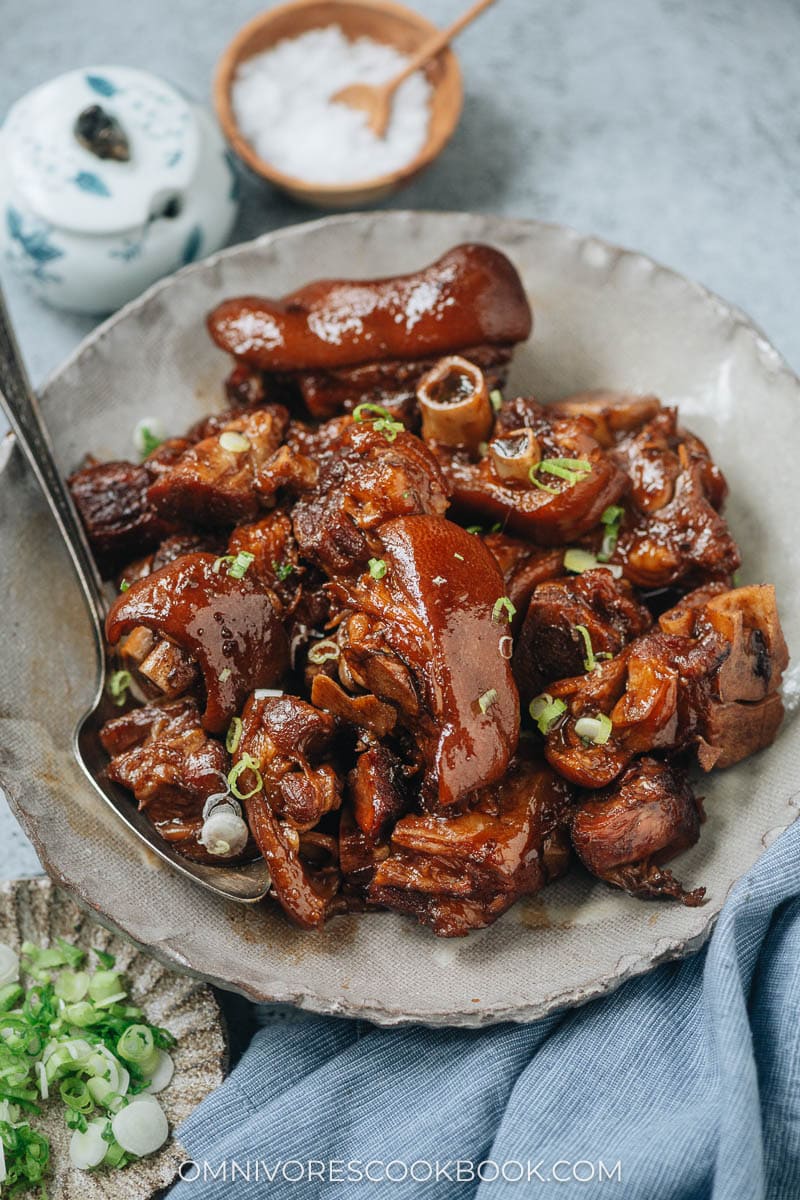
Braised pork trotters ingredients
Pork trotters
You can find pork trotters at most Chinese markets and Asian online grocery deliveries. These days, most shops sell the pre-cut trotters that you can cook directly. If you’re purchasing whole trotters, make sure to let the butcher cut them into large bite-size pieces (they usually cut one trotter into 6 pieces). The butcher has a very sharp saw to make clean cuts, which is much nicer than chopping them at home using a cleaver.
Mise en place
Making braised pork trotters requires a few common pantry ingredients:
- Pork trotters, cut into small pieces
- Aromatics: ginger and green onion
- Spices: star anise, clove, dried chili pepper
- Sauce: dark and light soy sauce, Shaoxing wine, sugar and salt
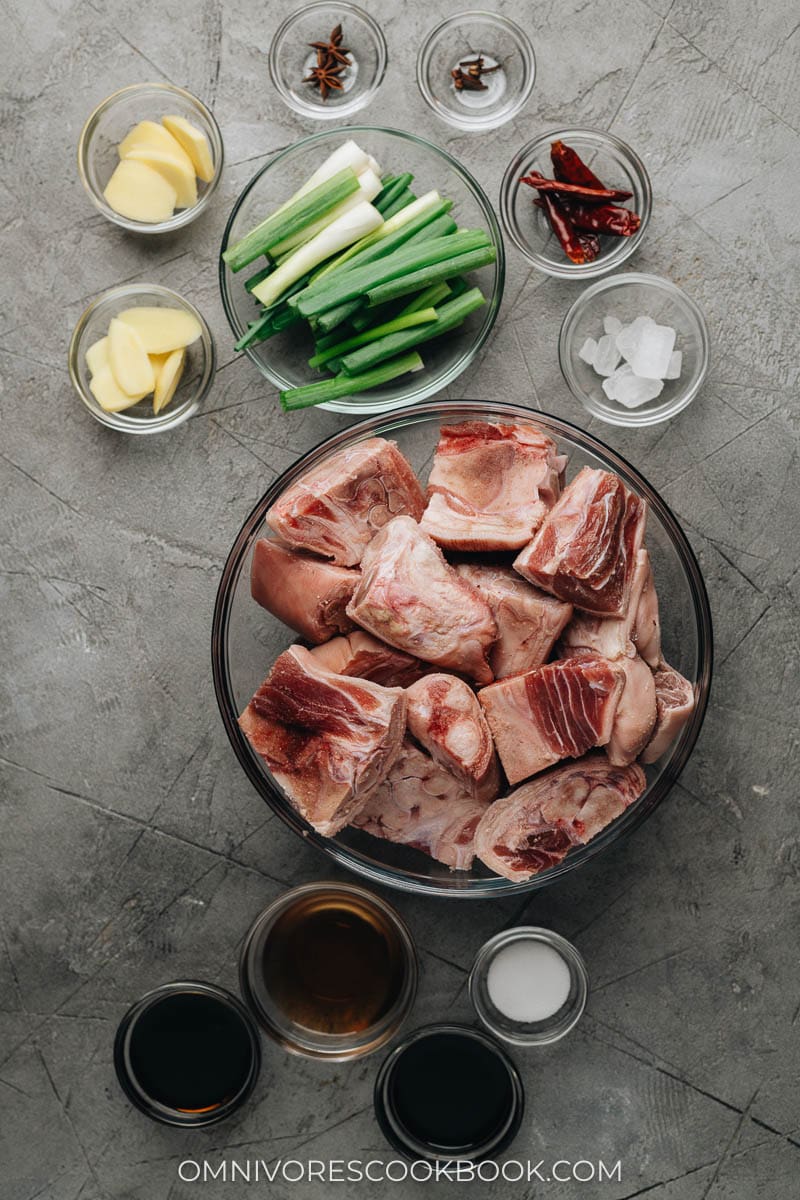
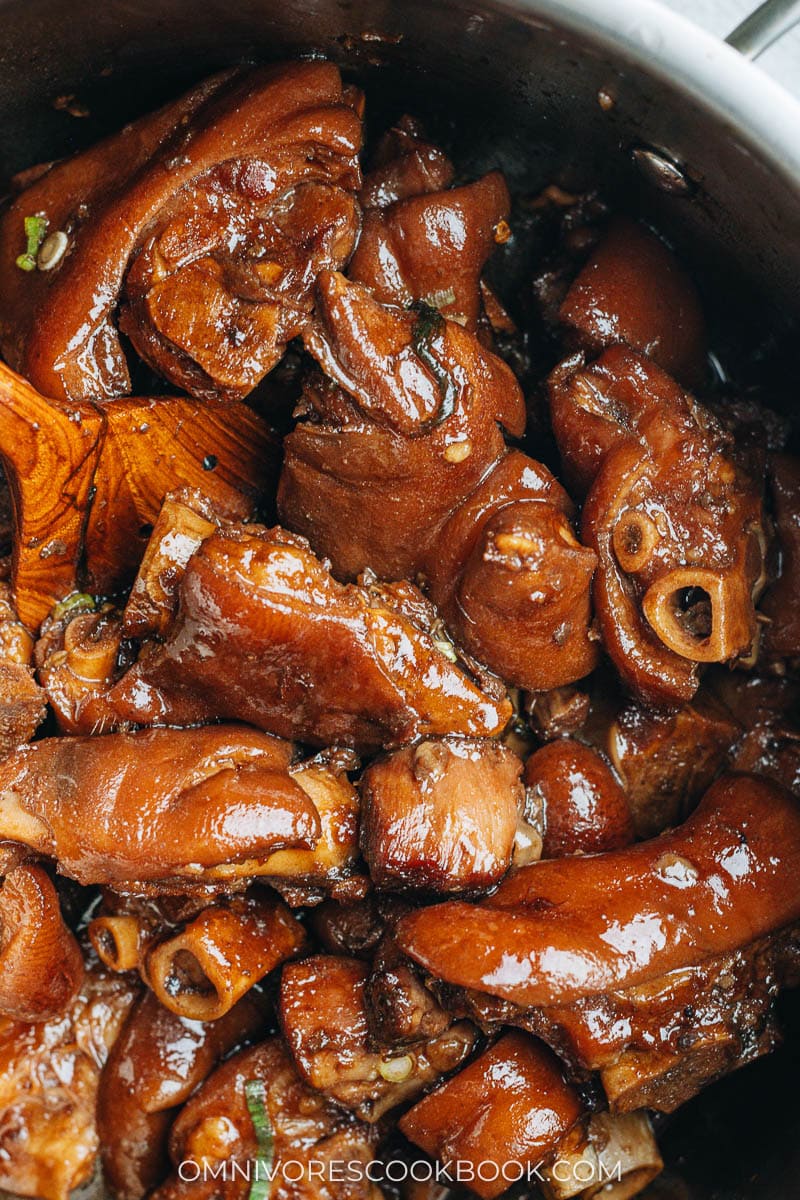
I used rock sugar in this recipe, which gives the sauce a more glossy look. You can use regular sugar as well.
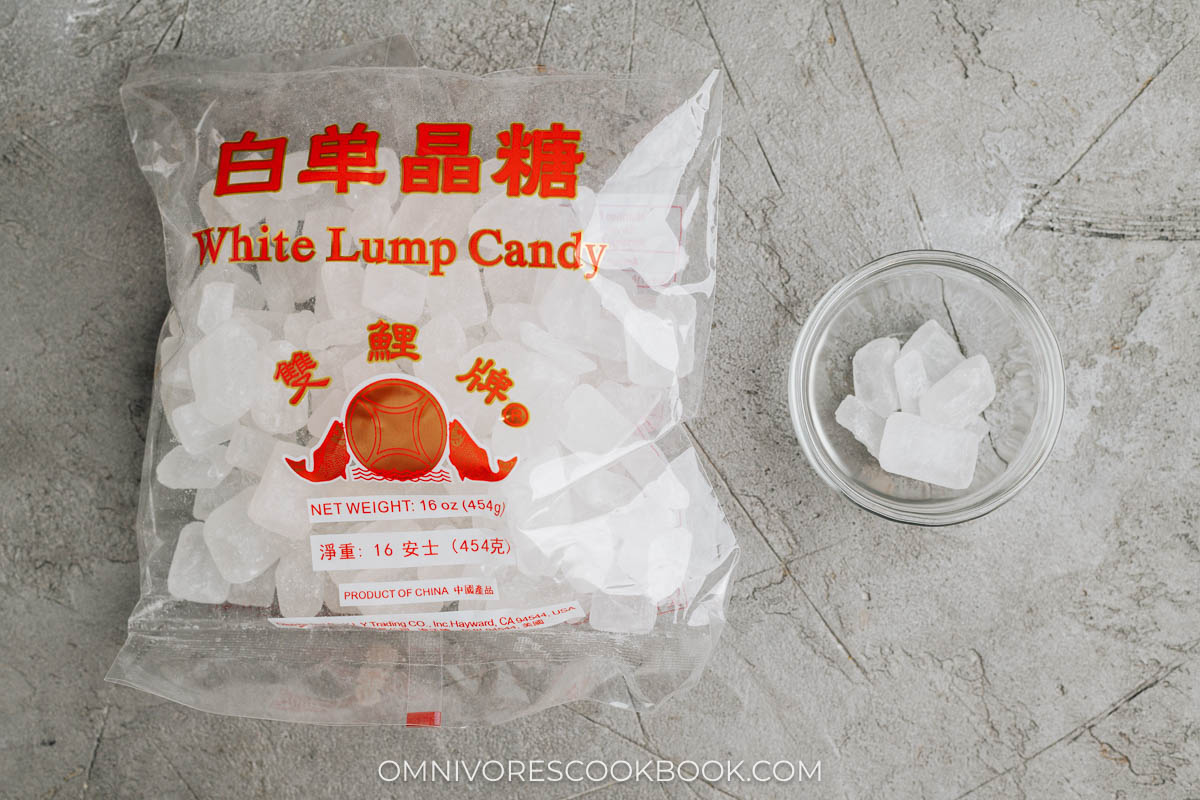
Dark soy sauce is used in this recipe to add an appetizing dark brown color to the sauce. If you don’t have it on hand, you can use regular soy sauce (with a touch of molasses if you have it). The sauce will come out with a lighter color but still be delicious.
Cooking process
Cooking braised pork trotters is quite easy, but it involves a bit of passive waiting time. That’s why I usually prefer to make a large quantity at one time and freeze the portion that I plan to serve later.
- Start the cooking with pork trotters, cold water and ginger
- Once boiling, skim the brown bits off the top
- Boil and skim until the broth almost runs clear
- Transfer the trotters with some of the broth into an Instant Pot or pressure cooker
- Pressure cook until the trotters turn tender
- Move the trotters and the broth to a large pot to cook on the stovetop
- Simmer with aromatics, spices and sauce
- Cook until the pork has become flavorful and super tender
- Reduce the sauce so it becomes thick and glossy
- Add back the pork and mix well
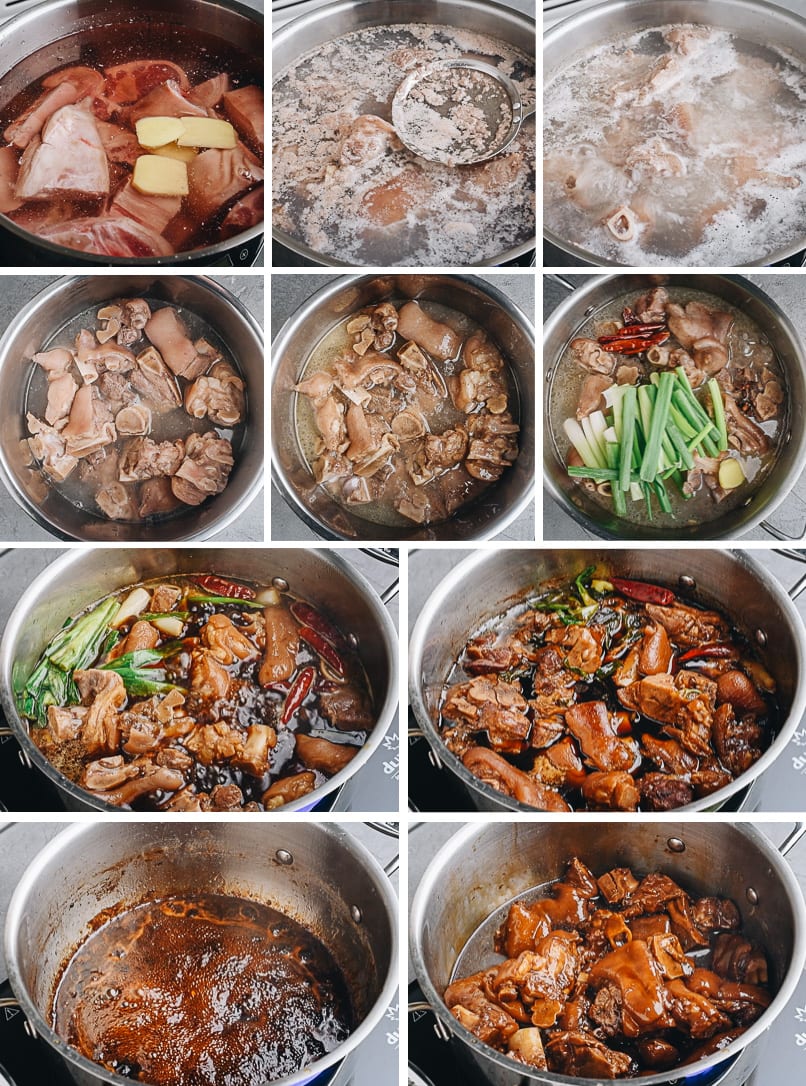
The whole cooking process does take some time, but most of it is passive. I highly recommend making the dish on the weekend, so you won’t be in a hurry and can use the time in between to do other things.
Frequently asked questions
Can I cook braised pork trotters without an Instant Pot?
Yes! It is quite easy to do so but will require a longer cooking time. It will take about 2 hours to simmer the pork in this case.
If you do cook this dish on the stove, I would also add the aromatics and spices at the beginning (once you finish skimming the broth). Then add the sauce ingredients after 1 hour. This will give the pork an even richer taste.
Do I have to reduce the sauce at the end?
I took the extra step of removing the pork from the pot and reducing the sauce, so the sauce will be thick and glossy. The thicker sauce stays on the pork better and gives it a richer flavor.
To simplify this step, you can leave everything in the pot and use high heat to slightly reduce the sauce at the end. In this case, make sure to constantly stir the pot, so the pork won’t stick to the bottom.
It’s also totally OK to not reduce the sauce at all, if you’re happy with the seasoning the way it is.
How to serve braised pork trotters
I always love to serve braised pork trotters over a bowl of steamed rice. Although some Chinese restaurants also serve them in noodle soup. Check out this simple tomato noodle soup recipe if you want to serve the trotters over noodles.
Since braised pork trotters are so rich tasting, I would pair them with a simple side dish such as Fried Cabbage, Baby Bok Choy Stir Fry, Spinach and Peanuts Salad, or Cucumber Salad.
How to reheat and store braised pork trotters
I like to store the extra portion in small containers in the freezer. They stay good for 3 to 4 months. To reheat, the best way is to thaw them overnight in the fridge, then heat them up thoroughly in a steamer. If you haven’t reduced the sauce much, you can also reheat them in a small pot over medium-low heat (you need to stir frequently to prevent it from sticking).
It’s possible to directly reheat them without thawing first, but it will take longer.
Do not heat the trotters in a microwave. The skin and connective tissue don’t heat well and will make explosive sounds. The dish will end up heating up unevenly and leave a mess in your microwave.
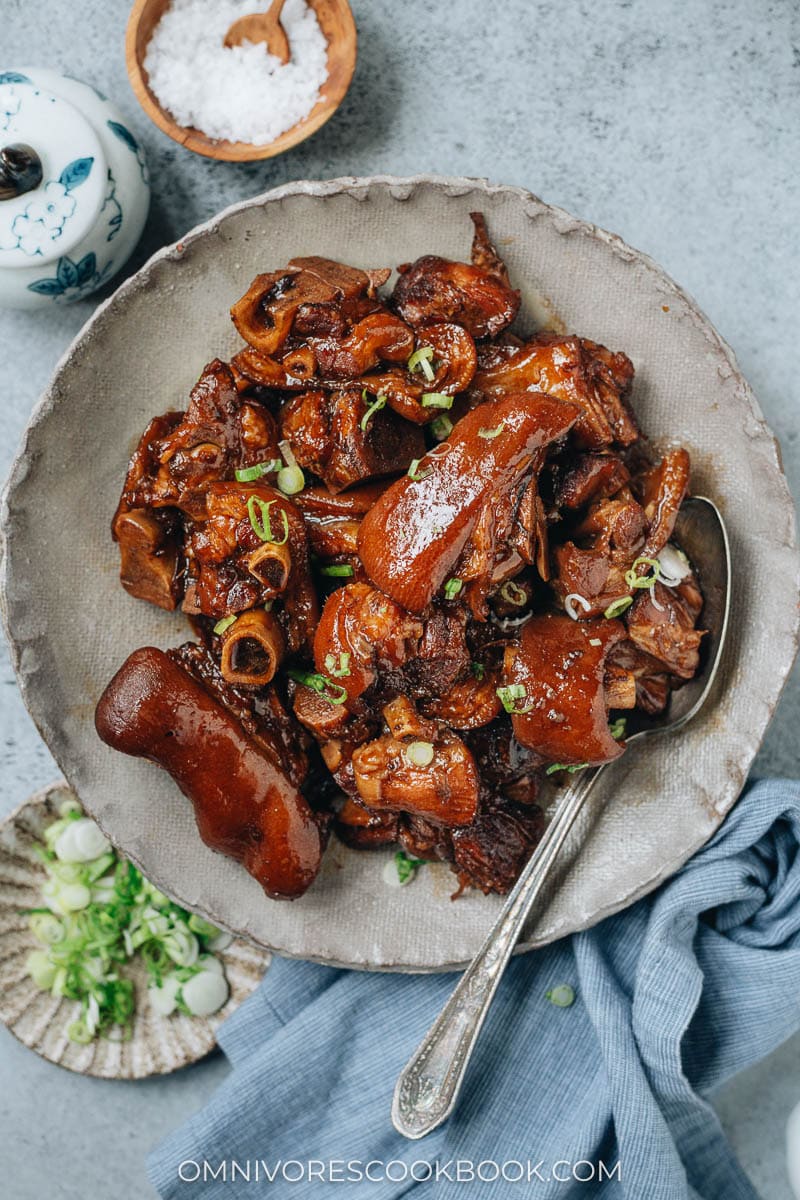
Other delicious make ahead main dishes
- Instant Pot Curry Beef Stew
- Chinese Chicken Dumplings (鸡肉饺子)
- Coca-Cola Chicken Wings (可乐鸡翅)
- Instant Pot Chinese Sausage Rice (腊肠饭)
- Easy Salt Baked Chicken (简易盐焗鸡)
- Chinese Braised Beef Shank (酱牛肉, Jiang Niu Rou)
Chinese Cooking Made Easy
Are you new to this website? This free email series is a great place to start. I’ll walk you through a few of my most popular recipes and show you how and why they work. You’ll quickly start to cook better Chinese food in your own kitchen.
Watch video
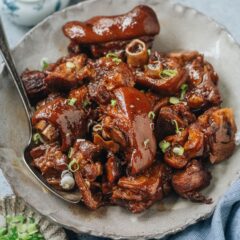
Chinese Braised Pork Trotters (红烧猪蹄)
Ingredients
- 3 to 4 lb pork trotters , cut into large cubes (*Footnote 1)
- 2 thumbs ginger , thickly sliced and divided
- 4 tablespoons Shaoxing wine (or dry sherry)
- 3 tablespoons light soy sauce
- 2 tablespoons dark soy sauce
- 4 green onions , cut into 4” pieces (or 2 Chinese scallions)
- 5 dried Chinese chili peppers
- 2 star anise
- 4 cloves
- 1 heaping tablespoon rock sugar (or regular sugar)
- 2 teaspoons salt
Instructions
- Place the pork trotters and half of the ginger slices in a large pot and add cold tap water to cover. Bring the water to a boil. Stir occasionally to prevent the bottom from sticking. Continue boiling while skimming off the brown foam from the top until the broth is mostly clear, 10 to 15 minutes. Transfer the pork to an Instant Pot (or pressure cooker). If the boiling broth is clear and doesn’t have a strong smell, transfer 5 cups of broth to the pot with the trotters, or until the broth almost covers everything. If the broth looks very cloudy and smells strong, discard the broth and add 5 cups of cold tap water. (*Footnote 2)
- Set the pressure to high and timer to 15 minutes for fall-off-the-bone tender pork (or 12 minutes for tender pork with some texture). Press start. (*Footnote 3)
- Once the Instant Pot is done cooking, release pressure naturally for at least 15 minutes. Then switch the valve to fast release. Transfer pork and the broth back to the large pot.
- Add the rest of the ingredients into the same pot and turn to medium-high heat. After bringing the broth to a boil, reduce to medium-low heat and simmer for 40 minutes or so, until the pork has absorbed a lot of flavor. Stir pork occasionally to avoid burning on the bottom.
- Transfer the pork to a large bowl. Use a ladle to remove and discard the solid spices and aromatics from the broth. Turn to medium-high heat to boil the broth until it reduces to half of the volume and gets thicker, 15 minutes or so. Keep an eye on the broth so it doesn’t reduce too much. The broth will continue to thicken when it cools down a bit, so you don’t need to reduce it too much.
- Add the trotters back to the pot and mix everything together. Serve hot as a main dish. You can store the leftovers in the fridge for 3 to 4 days, or in the freezer for up to 3 to 4 months.
Notes
- If you purchase the pork feet in an Asian market or online, most of the time the pork feet are already pre-cut into cubes. If you purchase whole pork feet, ask the butcher to cut the pork feet into 6 pieces using their saw. This recipe cooks up to 4 lbs (2kg) pork trotters, which is about 4 whole pork trotters.
- The pork will release juice during the cooking process, so you don’t need to add too much water to fully cover the pork.
- To cook without a pressure cooker, add boiled pork, water and all ingredients into a dutch oven. Add the broth (or water) until it covers the pork. Once boiling, simmer for around 2 hours. If the water level becomes too low while pork is still tough, add hot water, 1 to 2 cups at a time, and continue braising once the pork becomes very tender. Reduce the sauce according to step 6 if needed.
Nutrition

Did you make this recipe?
I’d love to hear how it turned out for you! Please take a moment to leave a 5-star rating ⭐️ and share your thoughts in the comments further down the page. It really helps others discover the recipe too.

Howard
It came out really good but it would have been even better if your recipe explains the difference between front and back trotters. Front has more meat vs back being more tendons. This would have made my meal great vs good!
Maggie Zhu
That’s a great point and I will definitely add that information into my post. I definitely prefer back trotters, which has more tendons and a bit more lean meat.
Where I live, it’s hard to just but back trotters because they are also sold whole in a pack. It would be great if you could find the back part by itself.
Thank you for leaving a comment to share your experience 🙂
Nikki
Can i use frozen trotters , do i need to defrost first?
Maggie Zhu
Yes you can. You should defrost them before cooking, otherwise they won’t cook evenly.
Barree
I tried this recipe and it was delicious ❤️
Jannie
I saw the video of cooking about 10-20 pork front legs cooked in a large pot and the spices in a small bag , I am looking to add those spices
Mary C
Oh my goodness! I tried the chinese baised pork tatters. “So so good. I love it!
Elena Kobilanska
Hi Maggie, I do not have pressure pot or instant pot. Only have slow cooker. How do I adopt the recipe without pressure pot please?
Many thanks
Maggie Zhu
I think it’s totally possible to cook it in a slow cooker. You can follow the recipe to boil the pork and skim the foam (to get rid of impurities, so the finished dish tastes better), then transfer the pork to the slow cooker. Then you should add everything else (broth or water, aromatics, and seasonings), cook on low for 6 to 8 hours. The pork should be very tender at the end. You can taste the dish (pork with the broth). If the seasoning is not strong enough, you can take out the pork, strain the broth, and reduce it on the stove (same procedure in the recipe). When cooked in a slow cooker, the color of the dish will be light and the broth thinner, because the liquid doesn’t evaporate much. But the pork will be a little more seasoned due to the slow cooking and should taste good. You can reduce the sauce or skip this step, depending on your personal preference.